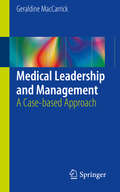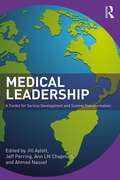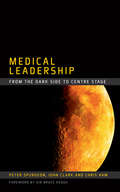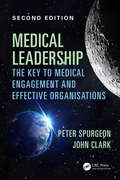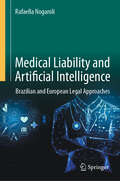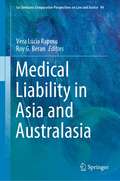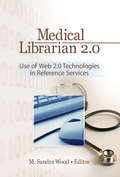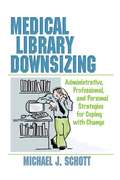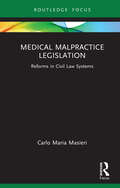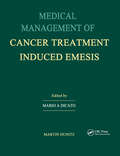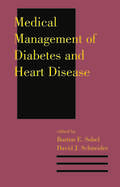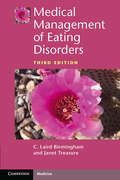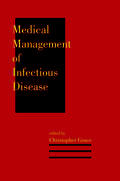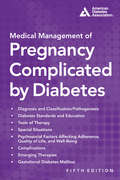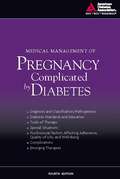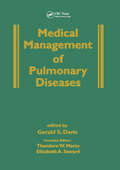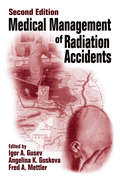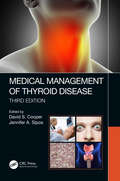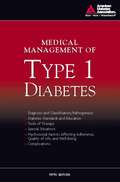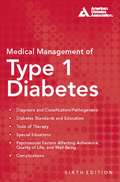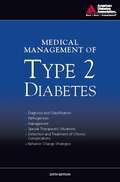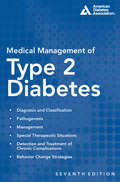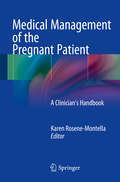- Table View
- List View
Medical Leadership and Management
by Geraldine MaccarrickLeadership and management in the context of healthcare is about improving the quality of medical care delivered at all levels. Doctors frequently lead healthcare teams with responsibility for significant clinical resource which requires management and leadership skills regardless of specialty. A growing body of literature has also argued that medical leadership plays an integral part in the success and effectiveness of organisational change in the health sector. Being an effective medical leader requires a different set of skills from being a good clinician. It is therefore important that future medical graduates are supported and equipped with the high-level skills required for their role (e. g. leading and developing multidisciplinary teams, understanding organizational systems, processes and interdependencies, redesigning services and working collaboratively with a wide range of stakeholders). This growing interest across the globe in preparing medical graduates for the role of medical manager and leader requires a comprehensive approach to education and training which begins at an undergraduate level. As an undergraduate these skills are frequently neglected or not taught well. However, with the correct resources and using a case-based approach the undergraduate program can easily support the development of practical leadership and management skills. The case studies and supporting text will provide an overview of the fundamentals of leadership theory and practice relevant to medical students, junior doctors and specialty trainees. Using internationally recognized competency frameworks this book will support the acquisition of knowledge and skills relevant to medical management and leadership such as project management, intelligent leadership, presentation skills, audit, organizational decision making and engaging relevant stakeholders.
Medical Leadership: A Toolkit for Service Development and System Transformation
by Jill Aylott Jeff Perring Ann Chapman Ahmed NassefToday’s health care systems need doctors and consultants to act as leaders, within the multi-disciplinary team, in addition to carrying out their clinical role. This book identifies the key elements of successful leadership through 'medically led' service development and systems transformation and shows how this benefits patient care, particularly when patients become partners in the process. The authors provide a conceptual framework of medical leadership and a set of scientific methods and tools that make a significant contribution to advancing quality and transforming services in healthcare. On top of this, they present analytical tools which medical professionals can use to support their own improvement or system transformation strategy, including ways of measuring improvement and the returns on investment of medical leadership. Woven throughout the book are real-life case studies from medical leaders across the world, providing students with valuable practical insights. Chapter summaries and reflections are provided to support learning. Medical Leadership will be essential reading for students on medical and clinical leadership courses internationally as well as for all practising doctors, consultants and General Practitioners.
Medical Leadership: From the Dark Side to Centre Stage
by John Clark Peter Spurgeon Chris Ham'Successful medical leaders are usually, but not always, experienced and credible clinicians with good people skills, who look beyond the boundaries of their own specialty or institution, who are positive and perseverant and who are prepared to take reasonable risks to achieve their goals. Most importantly they know how to engage their colleagues and effect change. They understand the principles of organisational performance and the balance between professional autonomy and corporate behaviour - ' Sir Bruce Keogh, in the Foreword This book is a comprehensive account of the key aspects of medical leadership. Easy to read and highly accessible, it explores how the medical profession has evolved in tandem with administrative and structural aspects of the NHS: previously reluctant leaders, doctors are increasingly positive about adopting management and organisational responsibility. Assuming leadership roles at all stages of their training and career is a progressively vital component of the definition of a 'good doctor'. Completely up-to-date, this book features exciting and critical developments such as the embedding of the Medical Leadership Competency Framework as a statutory element of the training and development of all doctors, and the establishment of a new Faculty of Medical Leadership and Management. It is highly recommended, inspiring reading for all medical professionals taking on formal leadership roles. Junior doctors, too, will find much of interest.
Medical Leadership: The key to medical engagement and effective organisations, Second Edition (Progressing Your Medical Career Ser.)
by John Clark Peter SpurgeonThis title is a comprehensive account of the key aspects of medical leadership. A highly accessible, text book-style resource, it explores how the medical profession has evolved in tandem with administrative and structural aspects of the NHS. Assuming leadership roles at all stages of their training and career is a progressively vital component of the definition of a good doctor. This book will provide invaluable support and guidance to anyone engaged in leadership within the NHS, but particularly to junior doctors in the primary and secondary care arenas taking on leadership roles for the first time.
Medical Liability and Artificial Intelligence: Brazilian and European Legal Approaches
by Rafaella NogaroliThis book offers an in-depth examination of the critical intersection between medical practice and artificial intelligence, analysing the benefits, risks, and complex challenges that AI introduces into the doctor–patient relationship. It provides comprehensive insights into the reconceptualisation of medical duties, addressing both their ethical imperatives and their binding legal force. With a particular focus on medical malpractice and medico-legal duties, the book examines the ethical principles underpinning the use of artificial intelligence in medicine and their correlation with legal obligations. It further provides a general overview of the regulatory framework governing AI within the European Union, drawing comparisons with existing legal concepts under the Brazilian legal system. This is the first book worldwide to focus exclusively on the analysis of medical liability within the context of artificial intelligence. Originally published in Portuguese, it is now presented in an expanded and fully translated English edition. Aimed at both academic institutions and legal and healthcare practitioners, this research monograph addresses a notable gap in the existing literature. It serves as a valuable resource for scholars, legal professionals, and medical practitioners seeking a comprehensive understanding of the intersection between AI and medical malpractice. Through its in-depth legal analysis and practical case studies, the book offers a focused examination of medical malpractice and civil liability arising from the use of AI systems, enhancing its relevance to a wide-ranging audience. The book encompasses a broad range of topics relating to medical liability in the context of AI systems, adopting a practical approach that renders its content applicable across different legal jurisdictions. The foundational concepts of Medical Law and artificial intelligence it presents are relevant to multiple national frameworks, thereby enhancing its accessibility. This adaptability and universal applicability position the work as a valuable resource for international audiences, offering insights and guidance that may be effectively applied in diverse legal and healthcare contexts.
Medical Liability in Asia and Australasia (Ius Gentium: Comparative Perspectives on Law and Justice #94)
by Vera Lúcia Raposo Roy G. BeranThis book brings together some of the most respected Asian and Australasian experts on medical liability to provide insightful perspectives on civil and criminal law from selected Australasian jurisdictions. It focuses on the idiosyncrasies of the existing law and case law in this part of the world with regard to medical liability, adopting a comparative and critical perspective. The aim is to provide an overview of the basic elements of medical liability in Asian and Australian jurisdictions, as well as the latest developments and general trends in jurisprudence.Given the broad range of jurisdictions covered, the book offers lawmakers, health administrators and practitioners, both in law and medicine, an alternative approach to the delivery of health care. Further, it is essential reading for all those (academics, lawyers, judges, researchers, practicing doctors and those involved in the growing area of legal medicine) working in medical liability, specially in the Australasian context.
Medical Librarian 2.0: Use of Web 2.0 Technologies in Reference Servics
by M. Sandra WoodWidespread use and acceptance of the World Wide Web in the home and office has eclipsed many other technological advances. Next-generation applications like wikis, podcasting, streaming video, virtual reference, RSS feeds, and blogs sit on the cutting edge of changes that will—and have already begun to—transform librarianship. Medical Librarian 2.0 is a vital groundbreaking resource for understanding and implementing these technologiesin reference services. Medical Librarian 2.0 is both an examination of current technology and a resource for practical applications as well. This important collection includes informative chapters that cover the evolving spectrum of digital tools. Through detailed explorations of current technologies, as well as the ways institutions have implemented them to better serve both patrons and staff, this text provides the insight and necessary awareness required for librarians who want to stay current with these technologies and to make their services relevant to the newer generation of users. With a wealth of informative tables, diagrams, Web site illustrations, online resources, photographs, and references, Medical Librarian 2.0 is an essential resource that looks at the pervasive Web technologies medical libraries—and other libraries—are successfully adapting to both update old services and provide new ones. Contributors to Medical Librarian 2.0 discuss: • the tools and applications shaping Web 2.0 • extending these vibrant technologies into librarianship with Library 2.0 • virtual reference services in academic health science libraries • e-mail, chat, and web forms in the changing landscape of reference services • syndicated information delivery via RSS and its integration • producing, using, organizing, and distributing podcasts • challenges to and successes of streaming video in health sciences libraries • social networking, social media sharing, and social bookmarking tools • tagging, peer production, blogs, and folksonomy • open source software and content management systems like Drupal • wikis and the organizational knowledgebase • creating and utilizing blended applications and mashups • current concerns over data and security • and many other important topics! With a wealth of tables, diagrams, Web site illustrations, online resources, photographs, and references, Medical Librarian 2.0 offers readers clear examples of these applications put into practice. Medical Librarian 2.0 is an essential resource for librarians, especially those in medical settings, library science educators and students, and those looking to stay at the forefront of emerging reference technology.
Medical Library Downsizing: Administrative, Professional, and Personal Strategies for Coping with Change
by Michael SchottLearn how to stay ahead of the game when budgets and staff are cutMedical Library Downsizing: Administrative, Professional, and Personal Strategies for Coping with Change explores corporate downsizing and other company-wide events as they relate to medical librarians in their organization. This training manual is designed to help librarians prepare for a new era where shrinking budgets, inflated journal costs, and the increasing demand for new and expensive services now put salaries and jobs at risk. While focused on health care issues, this book will appeal to a general library audience and can be used in a graduate course in library administration, corporate librarianship, or hospital librarianship.Medical Library Downsizing investigates the BCEs (Bad Corporate Events) that can negatively affect a librarian, including: an across-the-board budget cut a downsizing a restructuring (also called a re-organization or re-engineering) a buyout a merger a consolidation With Medical Library Downsizing, you will learn how to prepare for the possibility of a BCE, what signs to look for that a BCE is about to take place, and how to weather the storm. The book provides the typical patterns for a downsizing, budget cut, merger, or pension buyout—teaching you step-by-step to make the most out of each possible scenario. This unique guide uses sardonic wit and entertaining examples to bring home each lesson, making Medical Library Downsizing a vital asset to librarians in any field.Medical Library Downsizing will help you deal with: consultants who recommend downsizing and outsourcing staff communications planning your survival—and your escape route presentations to help you keep your job implementing change re-training staff and more
Medical Malpractice Legislation: Reforms in Civil Law Systems (Young Feltrinelli Prize in the Moral Sciences)
by Carlo Maria MasieriThis book aims to analyse the legal tools that the legislatures of France, Germany and Italy adopted in order to regulate medical malpractice.In the mid-1970s, a reform movement started in the United States, where there was considerable concern about then ongoing medical malpractice crises. Since the beginning of the current century, France, Germany and Italy have passed statutes that aim to reform medical liability rules. Thus, it is first interesting to assess whether any medical malpractice crises have been identified in these systems and, second, how these have been faced through the passing of new statutes on the continent. Accordingly, the first chapter explores the idea of medical malpractice crisis and its relationship with the insurance market, also considering the reflections of American scholars. It then reconstructs the French, German and Italian legal frameworks, as well as their insurance and litigation contexts, reviewing and commenting on the quantitative evidence that was collected before the reforms. The second chapter briefly summarises the debate on medical malpractice reforms in France, Germany and Italy. It then analyses the statutes that have been passed, distinguishing between reforms that consolidate case law and reforms that introduce innovative solutions, sometimes repealing court-developed doctrines. In particular, the chapter examines in a comparative perspective the diff erent options adopted in these civil law countries with regard to the rules on liability, burden of proof, statute of limitations and damages. Moreover, the chapter examines the reforms of insurance, procedural and evidence law, to the extent they affect medical malpractice cases. The third chapter reviews and analyses the current available data related to medical malpractice litigation and insurance after the reforms adopted in France, Germany and Italy, in order to find out evidence of their effectiveness and efficiency. It also highlights some aspects of medical malpractice law that still belong to the domain of the judiciary. It finally points out which problems may be addressed by the legislatures and what further data should be collected in the future.This work may interest legal scholars, healthcare providers, insurers and policymakers.
Medical Management of Cancer-treatment Induced Emesis
by Mario A DicatoNausea and vomiting are two of the most common side-effects of anti-cancer treatment, and the discovery and clinical application of 5-hydroxytryptamine3 receptor antagonists has transformed the management of these side effects, resulting in a much improved quality of life for cancer patients. This text presents a detailed overview of the management of cancer-treatment induced emesis in a number of different treatment settings, and focuses on the mechanisms and use of 5-HT3 receptor antagonists. Contributions are also included from the points of view of the nurse and the patient.
Medical Management of Diabetes and Heart Disease
by Burton E. Sobel David J. SchneiderThis state-of-the-art reference details current and effective symptom-specific strategies for the diagnosis and management of diabetic patients-emphasizing the exploration of therapeutic options available for the treatment of accelerated coronary complications associated with diabetes.Addresses the pathophysiology underlying advanced heart
Medical Management of Eating Disorders: A Practical Handbook For Healthcare Professionals
by Janet Treasure C. Laird BirminghamNow in its third edition, the Medical Management of Eating Disorders is the definitive text on the diagnosis and general management of patients with anorexia nervosa, bulimia nervosa, binge eating disorder and other related eating disorders. Providing up-to-date information and research on world-class treatments, this book helps health care professionals understand how to treat eating disorders and other subsequent medical complications that arise as a result of the patient's disorder. Each chapter begins with 'Study Questions' to focus the reader and put the relevant information into perspective, and concludes with 'Implications for Health Care Professionals' to summarise the key learnings of the chapter. 'Patient Information' sections are also included to give examples of how the topics covered can be presented to patients and families. This text is essential reading for all health care professionals involved in the care and management of patients with eating disorders.
Medical Management of Infectious Disease
by Christopher GraceThis text gathers information concerning the diagnosis and management of adult patients with infections in the outpatient setting. It includes tables, algorithms, pictures and diagrams to clarify and consolidate crucial points. Each chapter features key points boxes that summarize important topics and help direct providers to critical information.
Medical Management of Pregnancy Complicated by Diabetes
by Carol J. Homko Abbot R. Laptook Susan Biastre Julie M. Daley Donald R. CoustanPregnancy complicated by preexisting diabetes can be managed through expert protocols and patient partnerships. Based on the new American Diabetes Association recommendations, this revised edition widely expands on the fourth edition. Topics include: pre-pregnancy counseling, contraception, psychological impact, morning sickness, nutritional management, insulin, diagnostic testing and surveillance, gestational diabetes, neonatal care of infants, and postpartum follow-up.
Medical Management of Pregnancy Complicated by Diabetes
by American Diabetes Association Lois JovanovicPregnancy complicated by diabetes is a medical challenge that can be minimized through a program of expert protocols and patient partnerships. This book presents a complete package of these protocols that when followed, can help produce healthy infants in pregnancies complicated by type 1, type 2, and gestational diabetes.Based on an ADA Technical Review, this fourth edition provides up-to-date information that includes: new guidelines for treatment using the new insulin analogues; a discussion on the use of oral hypoglycemic agents in pregnancy; and the latest in obstetrical surveillance of pregnant women with diabetes.
Medical Management of Psychotropic Side Effects
by Aniyizhai AnnamalaiThis book is a practical guide for psychiatrists to use when treating patients for medical issues. Over the past 10-20 years, the number of medications prescribed for psychiatric illnesses has steadily increased, and psychiatric practitioners are frequently called upon to manage medical issues and side effects that result from psychotropic treatment. Covering a wide range of conditions from thyroid disorders to cardiac disease, this book is a helpful resource for understanding common adverse medical effects that occur when psychotropic drugs are administered. Presented in a practical format, each chapter discusses management of a particular medical problem or side effect and then provides a summary and flowchart of the major points highlighted in that chapter. Each chapter contains an overview of key medications causing a particular side effect. The book also includes special topics such as psychotropic prescribing in medical illness and tips on electrocardiographic interpretation. This easy-to-reference book aims to bridge the gap between medicine and psychiatry by elaborating on medical conditions seen in routine outpatient psychiatric practice. It serves as an invaluable tool for mental health providers, nurses, health educators, and pharmacologists alike.
Medical Management of Pulmonary Diseases
by Gerald S. DavisThis handy, accessible single volume presents useful clinical information to expose the pathophysiology underlying major pulmonary diseases, and traces the steps of treatment, from establishing diagnosis to managing therapy.Contains more than 400 summary tables, radiographs, pathology specimens, and other illustrations that encapsulate informat
Medical Management of Radiation Accidents
by Kenneth S. CohenAlthough radiation accidents are rare and often complex in nature, they are of great concern not only to the patient and involved medical staff, but to the media and public as well. Yet there are few if any comprehensive publications on the medical management of radiation accidents. Medical Management of Radiation Accidents provides a complete refe
Medical Management of Thyroid Disease, Third Edition
by David S. Cooper Jennifer SiposThe Third Edition of Medical Management of Thyroid Disease provides the most up-to-date practical guidance for the diagnosis and management of common and uncommon thyroid diseases. It reflects the advancement in guidelines and research for thyroid cancer, nodules and hypothyroidism; all presented in an accessible format with more illustrations and algorithms for management. The contributions of internationally renowned endocrinologists present the clinical aspects from the world’s perspective. <P><P>Key Features <li>Completely revised and updated <li> Reorganized with more algorithms for quick reference and enhanced usability <li> Edited by internationally renowned physicians in the field <li>Authoritative, comprehensive and yet easily digestible
Medical Management of Type 1 Diabetes
by American Diabetes Association Francine R. KaufmanA comprehensive resource for health care professionals that outlines the American Diabetes Association®'s recommended course of diagnosing and treating patients with type 1 diabetes. This comprehensive volume provides the basis for individualized, flexible, responsive treatment plans for patients with type 1 diabetes. It includes integrated approaches on blood pressure and lipid goals, proper nutrition, exercise, smoking cessation, and more. All based on the clinical practice recommendations of the American Diabetes Association®.
Medical Management of Type 1 Diabetes
by Francine R. KaufmanType 1 diabetes, formerly known as juvenile diabetes, is a complex disorder that requires a great deal of patient-guided self-care. In recent years, advances in diabetes treatment have dramatically shifted potential outcomes in the favor of the patient with diabetes. The challenge for health care professionals is to realize this potential through an individualized, flexible, and responsive treatment plan for patients with type 1 diabetes.Now in its sixth edition, Medical Management of Type 1 Diabetes offers health care providers the newest information and guidelines for the treatment of type 1 diabetes. Built on the foundation of multiple daily insulin injections and insulin pump therapy, this book guides health care providers in helping their patients continually strive for optimal blood glucose control. This new edition focuses on the latest molecular advances, new treatment methods, recent clinical trials, and the American Diabetes Association's Standards of Care. Key topics also include new insulins and administration protocols, advanced carbohydrate counting, and emphasis on continuing patient education.Individual sections address all of the topics in managing type 1 diabetes, including:Diagnosis and Classification/PathogenesisDiabetes Standards and EducationTools of TherapySpecial SituationsPsychosocial Factors Affecting Adherence, Quality of Life, and Well-BeingComplicationsEdited by Dr. Francine Kaufman, a widely recognized expert in the treatment of diabetes and of insulin therapy, and guided by the recognized authority of the American Diabetes Association's Standards of Care, Medical Management of Type 1 Diabetes is an essential addition to any clinician's library for the treatment and understanding of type 1 diabetes.
Medical Management of Type 2 Diabetes
by American Diabetes Association Charles F. BurantThis clinical book for health care professionals features the most up-to-date approaches and protocols for diagnosing and treating patients with type 2 diabetes.Over 18 million people are living with diabetes and the majority have been diagnosed as type 2-a group particularly at-risk for cardiovascular complications. Health care practitioners will find this comprehensive resource for type 2 indispensable, providing the most up-to-date guidelines for diagnosis, treatment, glucose, and cardiovascular disease risk factor control as well as nutrition and exercise. Professionals will find the array of treatment options for all stages of cardiovascular disease particularly useful, as well as the behavior modification strategies.
Medical Management of Type 2 Diabetes
by Charles F. BurantAs type 2 diabetes continues its rise in prevalence worldwide, there is an increasing need to study it and describe successful treatments. There are several options for treatment, including oral medications, diet and lifestyle modification, and insulin therapy. Knowing which method to select and how to apply it relies on several clinical guidelines that are updated every year by the American Diabetes Association.This new edition of Medical Management of Type 2 Diabetes provides care providers with the answers to their questions about implementing care. All of the contributors are experts in their fields, and they define the disease, including the progressive nature of type 2 diabetes; cardiovascular, microvascular, and neurological complications; care methodologies for special situations; and behavior change. All guidelines and standards have been updated with the latest developments in research, advances in medications and medical devices, and new understandings of how to effectively work with the patient.
Medical Management of Wildlife Species: A Guide for Practitioners
by Sonia M. Hernandez Heather W. Barron Erica A. Miller Roberto F. Aguilar Michael J. YabsleyThis book offers an all-encompassing resource for reliable information on the medical management of wild birds, mammals, amphibians, and turtles. Focusing on the medical information relevant to the wildlife setting, it covers triage, emergency care, and other key considerations in handling, diagnosing, and treating wild animals. The book's population-based approach encourages practitioners to understand individual animal care within the broader context. Medical Management of Wildlife Species: A Guide for Practitioners begins with a brief summary of natural history, and introductory chapters address general topics such as pre-release conditioning, post-release monitoring, and legal issues associated with handling wildlife species. Species-specific chapters provide practical information on medical management, including the most prevalent concerns for each species and the epidemiology of infectious diseases. Provides a complete reference to handling, diagnosing, and treating wild species Covers the full range of North American wildlife Includes concepts that can be applied to species globally Emphasizes information relevant to the wildlife setting Focuses on individual medicine, firmly grounded within population medicine for a broader approach Targeted at wildlife veterinarians, veterinary clinicians that will be presented with wildlife, veterinary technicians, and wildlife rehabilitators Medical Management of Wildlife Species is a must-have addition to the bookshelf of wildlife veterinarians and any veterinarian seeing occasional wild animals, as well as wildlife biologists and researchers.
Medical Management of the Pregnant Patient
by Karen Rosene-MontellaThis protocol-based book uses algorithms to discuss preconception care, care during pregnancy, labor and delivery, and the link between postpartum and ongoing primary care. The need for an educated provider community to care for pregnant patients is enormous, and Medical Management of the Pregnant Patient provides a practical handbook that addresses all aspects of this topic. A brief overview of physiology, its impact on pregnancy and diagnostics, and treatment recommendations are included. Each section covers both diseases that may exist independent of pregnancy and diseases unique to pregnancy. Additionally, symptom-based complaints are incorporated into each section and cross-referenced appropriately. Internal medicine physicians, obstetricians, family practitioners and gynecologists alike will benefit from the practical clinical guidelines presented in this book.
